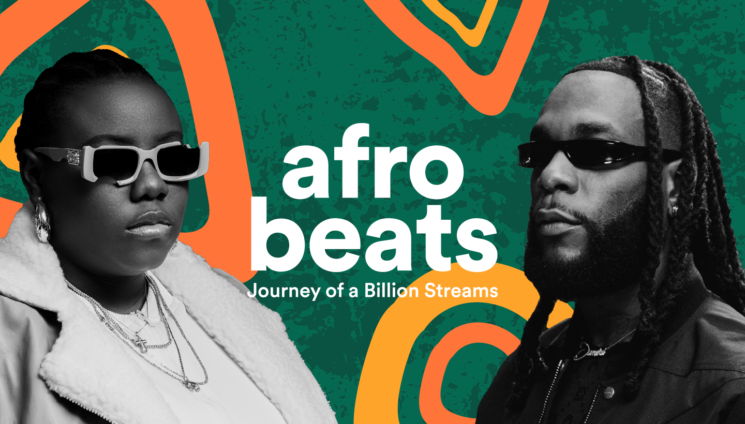Today, Spotify announced the launch of Afrobeats: Journey of a Billion Streams, a dedicated site that will track all things related to the genre.
From its origins in Ghana, its popularisation in Nigeria, its fusion with other genres as well as how it has become one of the continent’s biggest cultural exports.
Afrobeats is one of Africa’s biggest musical exports and is currently taking the world by storm. On Spotify, the genre has grown by 550% since 2017, and it was streamed more than 13 billion times in 2022, with its leading artists continuing to tick off giant milestones on the global music stage, across live events, awards and streaming.

The site will act as a repository for this cultural phenomenon housing text, infographics and visual elements, including Spotify streaming data and results from the Spotify-commissioned April 2023 Afrobeats survey.
The survey, conducted by research firm Kuvora, tracks the rise of Afrobeats and its cultural impact over decades.
The site will be updated on a biweekly basis for the next 8 weeks, but will remain active beyond this as an always-on resource, with frequent updates on new Afrobeats moments. It will also include an interactive experience for fans to discover and connect with new knowledge on Afrobeats.
“There is no doubt that Afrobeats as a genre is here to stay, and will only continue to shatter more ceilings. In 2023 alone, the genre has been played for more than 223 million hours with streams exceeding 7.1 billion on Spotify. We created this site for both new and longtime fans of the genre, who would like to have a better understanding of how and where this explosive sound came to be,” says Jocelyne Muhutu-Remy, Spotify’s Managing Director for Sub-Saharan Africa.

Afrobeats: Journey of a Billion Streams will have five key pillars; Origins, which explores the genres that acted as precursors of Afrobeats as we know it, including Afrobeat, Highlife and Juju among others. The second pillar will be Evolution, and which industry players contributed to the current Afrobeats sound that the whole world cannot seem to get enough of.
The fusion of Afrobeats with genres such as Reggaeton, Amapiano and others and their impact on Afrobeats’ success story will be the third pillar. Cultural exportation, especially to countries outside Africa and Afrobeats’ role in this through music, food, language and fashion lenses will be the fourth pillar.

The fifth pillar will focus on the Women of Afrobeats, shedding light on some of the key female figures whose contributions to the industry propelled the genre to its current status as a global sensation.
The site will also include key Afrobeats timelines over the years, interesting Spotify data, excerpts from interviews with industry experts and man-on-the-street videos from key markets in Sub-Saharan Africa.
Origins, the first instalment of the Afrobeats journey is now live at afrobeats.byspotify.com.
Latest Stories
-
Ghana and Seychelles strengthen bilateral ties with focus on key sectors
23 mins -
National Elections Security Taskforce meets political party heads ahead of December elections
27 mins -
Samsung’s AI-powered innovations honored by Consumer Technology Association
46 mins -
Fugitive Zambian MP arrested in Zimbabwe – minister
1 hour -
Town council in Canada at standstill over refusal to take King’s oath
1 hour -
Trump picks Pam Bondi as attorney general after Matt Gaetz withdraws
1 hour -
Providing quality seeds to farmers is first step towards achieving food security in Ghana
2 hours -
Thousands of PayPal customers report brief outage
2 hours -
Gary Gensler to leave role as SEC chairman
2 hours -
Contraceptive pills recalled in South Africa after mix-up
2 hours -
Patient sues Algerian author over claims he used her in novel
2 hours -
Kenya’s president cancels major deals with Adani Group
3 hours -
COP29: Africa urged to invest in youth to lead fight against climate change
3 hours -
How Kenya’s evangelical president has fallen out with churches
3 hours -
‘Restoring forests or ravaging Ghana’s green heritage?’ – Coalition questions Akufo-Addo’s COP 29 claims
3 hours

